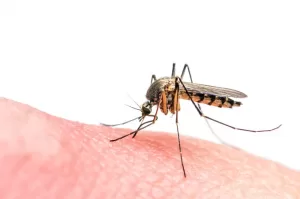In the past few years there has been a lot of talk about the Zika virus- there is particular concern about pregnant women who plan to travel to areas where Zika infection rates are high. But what exactly is the Zika Virus and what harm can it cause?
The Zika virus infects humans by who are bitten by certain types of Aedes mosquito. It can also be passed on by sexual contact with an infected person, though this is less common. In theory, it could also be transmitted through a blood transfusion from an infected donor. However, the Australian Red Cross Blood Service postpones blood donations from people who have been to places where mosquito borne illnesses such as Malaria and Dengue are an issue- and at present this also covers Zika infected areas.
What are the symptoms of Zika Virus?
Most people who get infected have no symptoms at all. If symptoms do happen, they’re usually mild and start 3 to 12 days after being bitten by the infected mosquito. Illness tends to last from 4 to 7 days- it may involve fever, rash, headache, conjunctivitis, muscle aches and joint pain. Whilst there has been some debate over the complications of Zika Virus, there is now a lot of evidence that it can cause developmental malformations, including microcephaly (an abnormally small head), in babies born to mothers exposed to the virus during pregnancy. There can also be complications affecting the nervous system including Guillain-Barré Syndrome.
How can Zika infection be avoided?
Unfortunately, there is no vaccine as yet. Obviously, infection can be avoided by not travelling to regions where the virus is present. However, if this is not possible, the first line of defence is to avoid mosquito bites by wearing appropriate clothing (long sleeved shirts and trousers), applying insect repellent, sleeping in air-conditioned/screened rooms, and using a mosquito bed net if needs be (they work better if soaked in Permethrin before use). It’s important to remember that the type of mosquito that causes Zika bites all through the day, not just in the evening. The sexual partners of travellers who have been infected with Zika while overseas are also at risk- this risk is reduced by using condoms. For more detailed advice regarding the necessary sexual precautions, click here .
Zika in pregnancy or planned pregnancy
Current advice is that pregnant women should try to avoid travel to high risk countries. For moderate risk countries, a pregnant woman should consider postponing or cancelling travel plans, based on their individual risk assessment. If the woman does decide to travel, discussion with a doctor beforehand is advised. Women who are planning pregnancy should avoid getting pregnant whilst in a country that has moderate to high Zika risk, and for a further 8 weeks after they leave the area. Women should also avoid unprotected sex for 6 months with a male partner who may have been exposed to the virus or has travelled in a region where there is risk.

How is Zika Virus diagnosed?
A blood sample can be tested for the virus (if early in the illness) and for antibodies against Zika virus. A second blood test 2 weeks later may be needed to confirm recent infection. It can be hard to diagnose, and there are several other illnesses that can cause similar symptoms.
Is there any treatment?
There is no specific treatment for Zika. Simple measures such as Paracetamol and rest are usually all that is needed. It is advised to avoid Aspirin or anti-inflammatories because of possible increased risk of bleeding with related viruses, such as dengue, as well as the risk of a rare but serious illness called Reye’s syndrome after viral infection in children.
Pregnant women with Zika will usually need close obstetric follow-up for advice and monitoring of the baby.
Which countries are affected by Zika?
At present, there is no significant risk of Zika virus in Australia. The Department of Health monitors the international situation and have a list of risky regions, which can be found here.
For more information on the Zika Virus, speak to your GP or local travel clinic.
Getting a Mental Health Care Plan in Australia: Your Guide
Getting a Mental Health Care Plan in Australia: Your Guide Mental health matters—and if you’re feeling overwhelmed, anxious, or down, a mental health care plan can help. But what is it, and how do [...]
UTI Symptoms and Treatment: What You Need to Know
UTI Symptoms and Treatment: What You Need to Know Urinary Tract Infections (UTIs) are common, uncomfortable, and often disruptive. But what exactly are the signs to watch for, and how can you get relief [...]
Free Mental Health Care Plan Online | Bulk-Billed by Qoctor
Free Mental Health Care Plan Online | Bulk-Billed by Qoctor Discover how to get a free, bulk-billed Mental Health Care Plan (MHCP) in Australia through Qoctor's telehealth service. Accessing [...]




